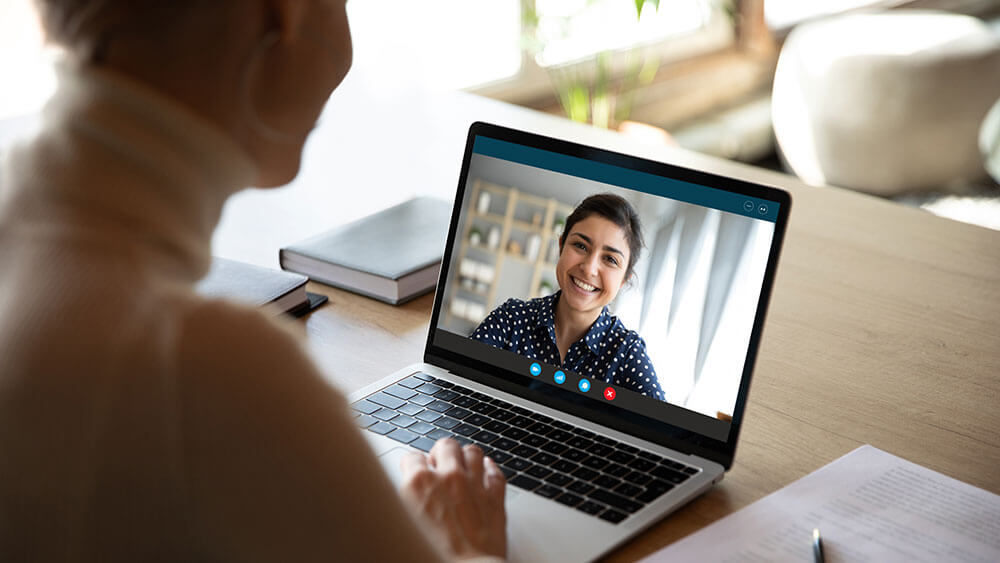
Making yourself familiar with the videoconferencing software you are using is an important part of having a successful virtual job interview.
U.S. employers added 2.5 million jobs in May, the Labor Department announced June 5. And according to numerous reports, because of the COVID-19 pandemic, now more than ever recruiting and hiring managers are interviewing job candidates online as opposed to in person.
A recent report from the talent acquisition group Jobvite suggests that hiring managers are turning to videoconferencing platforms to interview job candidates. The report, titled “How Recruiters are Adapting to a World of Remote Recruiting,” showed that 80 percent of respondents to its early April survey of more than 200 recruiters said they have been using video for interviews. About 61 percent of the respondents from a variety of industries said they use video when screening candidates.
With video interviews becoming another new normal, the resume writing service ResumeGo recently conducted a survey of 277 hiring professionals, hoping to understand how recruiters feel about online interviews and to get some advice for job seekers who are currently going through the online hiring process.
Based on the responses, we’ve come up with a list of what potential hires can expect in an online job interview, and how they should prepare.
Be Ready With Your Tech
The most common issue for job seekers, 36 percent of respondents to the survey said, was a problem with the videoconferencing software. Another 9 percent said poor audio quality, while 5 percent said poor video quality.
All these responses are tech-related, so make sure you have studied the videoconferencing software the recruiter chose, and practice using it with a friend before your interview to iron out any issues. Also, do the simple prep work to ensure you have the best possible connection discussed in the “Live From the Living Room: Connecting and Presenting Virtually” section of Convene’s “Top Takeaways From Global Virtual Events Day.”
In the survey, 27 percent of the hiring pros said their interviewees also suffered from loud background noises in their homes disrupting the interview. Another piece of advice from Global Virtual Events Day: Initiate a “closed door” policy for the length of your interview, so family members or pets don’t interrupt and ambient noise is kept to a minimum.
It’s Still a Job Interview, So Treat It Like One
Two other common issues for job seekers, according to the survey, were the same issues you would avoid in an in-person interview: Don’t be late and dress professionally.
With 16 percent of hiring pros surveyed by ResumeGo choosing “late for interview” was the third-biggest issue brought up. The final issue, with 7 percent of respondents choosing, was interviewees wearing improper attire. As career coach Latesha Byrd told Money, even if you only dress the part from the waist up, look professional.
Remember, an online interview really is no different than an in-person interview. You have to present the best you that you can be.
Don’t Worry About Having Been Laid Off
Tens of millions of people have lost their jobs since the pandemic began. But according to the ResumeGo survey, hiring professionals aren’t going to hold that against a potential hire. A majority — 79 percent — of those surveyed said it would make no difference to them if an applicant had been laid off from another job during the pandemic. Even more encouragingly, 21 percent said that if a candidate had been laid off, they were more likely to hire the person.
If you are still feeling down or less confident about having been laid off, consider the advice of psychologist David Leahy, director of the American Institute for Cognitive Therapy in New York. When you find yourself out of work, he told Quartz at Work, you should focus on only two priorities: looking for a job and, more importantly, taking care of yourself. He goes on to give specific thoughts on how to reach each objective.
You Recovered From COVID-19, Now What?
In the ResumeGo survey, 69 percent of hiring professionals responded that a job candidate’s previous COVID-19 illness would not be a factor in their hiring decision. Another 29 percent said it would make them more likely to hire the individual, while two percent said it would make them less likely to hire them.
In fact, your past illness more than likely won’t even come up in the interview. The Americans with Disabilities Act (ADA) prevents an employer from asking about the health conditions of a prospective employee.
However, “an employer may screen job applicants for symptoms of COVID-19 after making a conditional job offer, as long as it does so for all entering employees in the same type of job,” according to F. Beaumont Howard, a partner at Fox Rothschild LLC. The Atlanta-based attorney, who focuses on labor and employment law among other things, has written papers focusing on how the Equal Employment Opportunity Commission (EEOC) has updated its ADA and Rehabilitation Act guidance to clarify them in light of COVID-19.
Employers may ask employees returning to the same workplace after recovering from the virus for a doctor’s note certifying their fitness to return with endangering others in the office, Howard wrote in the article.
Curt Wagner is an associate editor at Convene.
